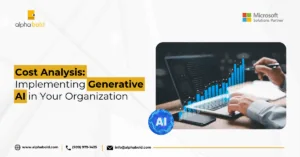AI in Small Business: Practical Applications, Myths, and Adoption Tips
Table of Contents
Introduction
Artificial Intelligence is no longer reserved for large enterprises. Small and mid-sized businesses (SMBs) are adopting AI to improve efficiency, reduce costs, and strengthen decision-making. From automating customer support to refining marketing strategies, AI applications for small businesses are becoming both affordable and practical.
Yet many SMB leaders hesitate due to misconceptions around cost, complexity, or lack of technical expertise. This blog addresses these concerns by:
- Highlighting real use cases for AI in small businesses that deliver measurable value.
- Debunking myths that often stall adoption.
- Offering practical steps SMBs can take to adopt AI responsibly and effectively.
Backed by real-world examples and the latest 2025 AI trends, this guide helps decision-makers cut through the noise and identify where AI can make the biggest impact in small business operations.
Why AI Matters for SMBs
AI in small business is no longer a futuristic concept. In 2025, it has become a practical driver of efficiency, growth, and competitive advantage. Small and mid-sized businesses (SMBs) face rising costs, talent shortages, and increasing customer expectations. AI helps address these challenges directly.
- Boosts Productivity and ROI: Surveys report that 85% of SMBs already using AI expect measurable returns, and 71% plan to increase their AI investment within the next year. AI automates repetitive tasks such as scheduling, invoicing, and data entry, giving teams more time to focus on strategy and customer engagement.
- Adoption is Becoming Widespread: Research by Intuit and ICIC found that 89% of small businesses are already using AI tools, largely to automate routine work and support faster decision-making. This shows that AI in SMBs is no longer experimental.
- Levels the Playing Field: According to a July 2025 ActiveCampaign survey, 77% of small business professionals say AI improves their confidence in work quality, while 75% believe it enhances their ability to compete with larger firms. Affordable SaaS-based AI solutions for small businesses make advanced capabilities accessible without heavy infrastructure.
- Global Proof Points: Deloitte and Meta’s research in Asia-Pacific found that 80% of SMEs using digital platforms reduce operational costs, and 73% believe these tools help level the playing field. While not all of these platforms are strictly “AI,” the results demonstrate how digital and AI-driven adoption delivers measurable value worldwide.
In short, AI in small business helps leaders improve efficiency, reduce costs, and remain competitive in fast-moving markets.
Practical AI Applications for SMBs
AI in small business is most effective when applied to daily operations that impact customer satisfaction, resource management, and financial performance. These examples highlight where SMBs are already seeing results.
Customer Support Automation:
AI-powered assistants such as Dynamics 365 Customer Service Copilot resolve common queries instantly, allowing support teams to focus on complex cases. Similar capabilities are available through chatbots like Intercom or Zoho Desk, making 24/7 service more affordable and consistent.
Sales and Marketing Intelligence:
Dynamics 365 Sales Copilot provides contextual insights during customer interactions and integrates with LinkedIn Sales Navigator for stronger prospecting. SMBs also benefit from tools like HubSpot or Mailchimp, which use AI to segment audiences and optimize campaigns. Together, these platforms illustrate how AI for small business marketing drives smarter engagement.
Inventory and Supply Chain Optimization:
AI-enabled forecasting in Dynamics 365 Business Central and NetSuite Inventory Management helps SMBs predict demand, reduce overstock, and streamline procurement. These enterprise-grade features are now available in scalable, cloud-based platforms that smaller businesses can adopt without heavy infrastructure.
Financial Forecasting and Expense Management:
Microsoft Power BI applies machine learning to financial data, giving SMBs real-time visibility into spending, profitability, and cash flow projections. Paired with NetSuite Financial Management or widely used tools such as QuickBooks, AI turns raw data into actionable insights for tighter budget control.
Recruitment and HR Automation:
Dynamics 365 Human Resources supports AI-driven hiring workflows, from screening resumes to predicting employee attrition. Other platforms, including Workable and Breezy HR, also use machine learning to shorten hiring cycles and improve workforce planning for SMBs.
These applications demonstrate how artificial intelligence solutions for small businesses are already built into widely used platforms. Whether through Microsoft Dynamics 365, NetSuite, or other SaaS tools, SMBs can adopt AI gradually, achieving measurable efficiency improvements and reducing costs without large upfront investment.
Further Reading: Building Next-Gen RAG Applications with Agentic AI
Ready to Explore AI for Your Business?
Adopting AI does not have to be overwhelming. Whether you are evaluating Microsoft Dynamics 365, NetSuite, or other AI-enabled platforms, our consultants help you identify the use cases that deliver the highest ROI.
Request a ConsultationCommon Myths About AI in SMBs
Reality: Many AI solutions for small businesses are SaaS-based with subscription or pay-as-you-go models. This makes adoption affordable and scalable without large upfront investment.
Reality: Modern AI applications often come pre-trained. They deliver insights from existing datasets, even when those datasets are relatively small.
Reality: Low-code platforms such as Microsoft Power Platform and prebuilt integrations in NetSuite allow SMBs to get started quickly. Consulting partners can further reduce complexity.
Reality: AI is designed to complement teams, not replace them. It automates repetitive, time-consuming tasks so employees can focus on strategic and customer-facing work.
Tips for Successful AI Adoption in SMBs
Adopting AI in small business works best when leaders approach it as a phased journey rather than a single project. These steps help ensure adoption is smooth, cost-effective, and tied to real business outcomes.
- Start with a Clear Use Case: Identify one area where AI can immediately reduce effort or costs, such as automating email responses or financial reporting. A focused pilot helps build confidence before scaling.
- Select Tools Designed for SMBs: Choose platforms like Microsoft Dynamics 365, NetSuite, or other SaaS solutions that offer strong support, easy integration, and scalability. Tools built for smaller organizations lower the barrier to entry.
- Enable and Educate Your Team: Train staff on how AI features work and demonstrate how these tools support, rather than replace, their roles. Adoption improves when employees understand the value and feel confident using the technology.
- Define Success Metrics: Set measurable objectives such as reduced processing time, improved lead conversion, or lower operational costs. Tracking results ensures every AI initiative ties directly to business goals.
- Maintain Transparency and Trust: Communicate openly with customers and staff about how AI is being used. Respect data privacy and highlight the human oversight behind automated processes to strengthen trust.
By following these steps, SMBs can integrate AI solutions for small businesses responsibly and at a pace that matches their growth strategy.
Not Sure Where to Start with AI in Small Business?
AlphaBOLD's experts help you identify high-ROI opportunities in small business operations. We design a phased adoption roadmap aligned with your business goals.
Request a ConsultationConclusion
AI in small business has moved from experimentation to everyday use. Companies are applying it to streamline operations, manage resources with greater accuracy, and strengthen customer interactions. With AI solutions already embedded in the Microsoft ecosystem and NetSuite, SMBs now have access to capabilities that once required enterprise-level budgets.
The most effective adoption comes from starting small, addressing clear use cases, and scaling gradually. By approaching AI as a practical extension of existing systems, SMBs can reduce costs, improve decision-making, and create the flexibility needed to stay competitive in a changing market.
Explore Recent Blog Posts







